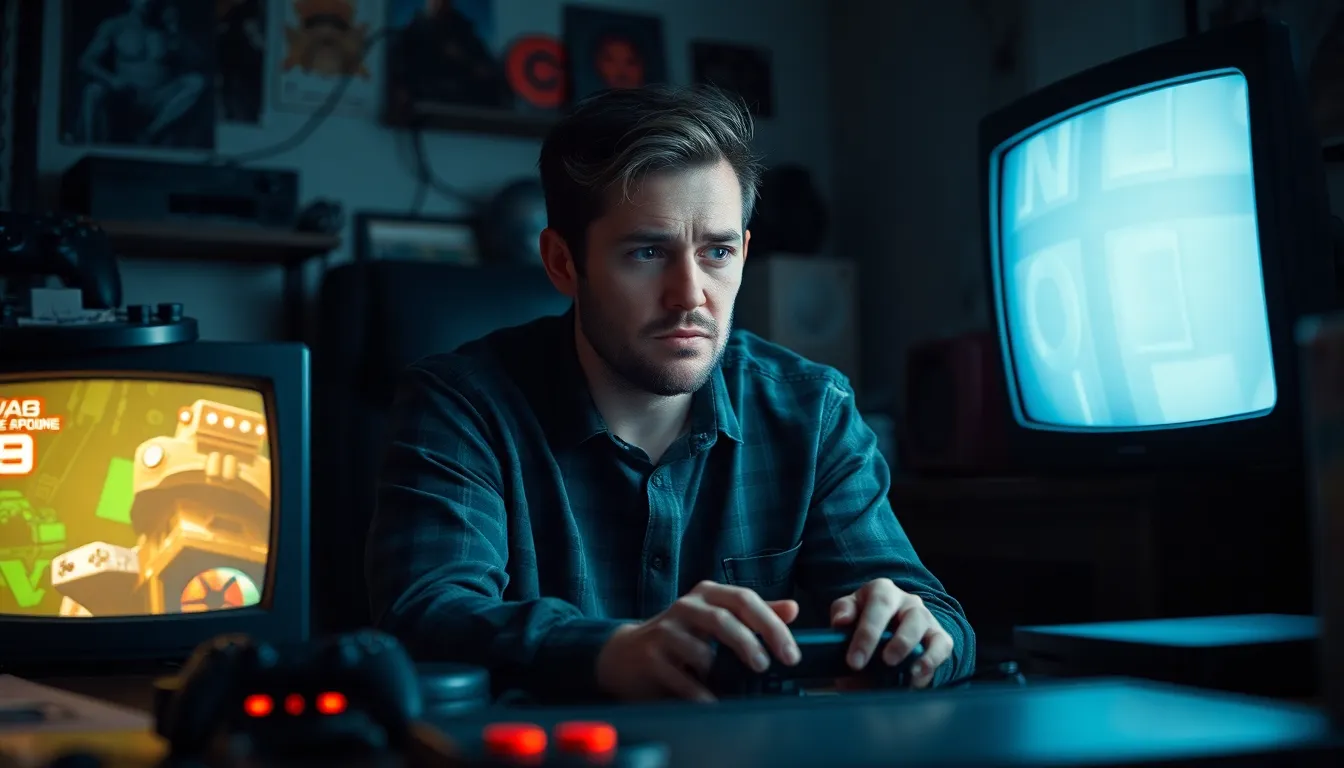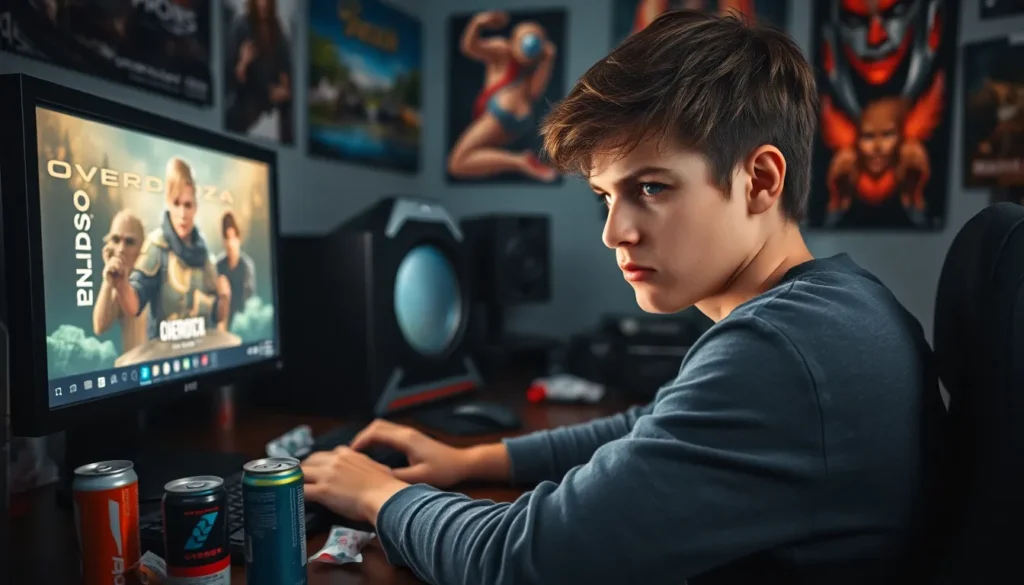In a world where epic quests and pixelated adventures reign supreme, many find themselves glued to their screens for hours on end. But as the virtual dragons are slayed and high scores achieved, a nagging question looms: can too much gaming lead to anxiety? While leveling up in a game feels exhilarating, the aftermath might leave players feeling more like they’ve just faced a boss battle in real life.
As gaming culture continues to thrive, understanding its impact on mental health becomes crucial. Could that marathon gaming session be the hidden culprit behind rising stress levels? Join the quest to uncover the truth about gaming and anxiety, and discover whether it’s time to hit pause or just upgrade to a new strategy. After all, nobody wants to trade their gaming glory for a real-life anxiety attack—unless it comes with extra lives.
Table of Contents
ToggleCan Too Much Gaming Overdertoza Cause Anxiety?
Excessive gaming can lead to increased anxiety levels. Players often find themselves immersed in Overdertoza, which may blur the lines between reality and the virtual realm. Constantly facing challenges and obstacles in a game can mirror real-life stressors, resulting in anxiety.
Research indicates that people playing for more than two hours a day are at a higher risk for anxiety symptoms. Individuals may experience feelings of loneliness, especially when gaming replaces social interactions. Isolation can further exacerbate mental health issues, leading to increased feelings of unease.
Observing changes in mood becomes crucial. Irritability and restlessness can manifest in gamers who spend extended periods in virtual environments. Some studies show that frequent gamers may develop a dependency, feeling compelled to play despite negative consequences. This cycle often contributes to heightened stress and anxiety.
Recognizing signs of anxiety is essential for maintaining mental wellness. Physical symptoms such as increased heart rate and difficulty concentrating can emerge alongside excessive gaming. It’s important to establish healthy boundaries around gaming time and seek activities that promote social interactions.
Exploring alternative hobbies can mitigate anxiety. Engaging in physical exercise or spending time outdoors offers balance and reduces the mental strain associated with prolonged gaming sessions. Mindfulness and relaxation techniques may also help players manage anxiety levels related to gaming.
Ultimately, fostering awareness around gaming habits is necessary. Heeding the mental health implications can lead to healthier gaming practices and improved overall well-being. Making informed decisions about gaming frequency will create a positive impact on mental health.
Understanding Overdertoza

Overdertoza represents a unique gaming environment that captivates its players. Its immersive experience can lead to extensive playtime, which often raises concerns about mental health.
Definition and Impact
Overdertoza is a multiplayer online game designed to foster adventure and interaction in a virtual world. Engaging extensively with these game environments can lead to an imbalance in daily life. Players investing over two hours daily in Overdertoza face an elevated risk of developing anxiety symptoms. The disconnect from reality caused by immersive gameplay may heighten feelings of loneliness. Research indicates that prolonged gaming can replace essential face-to-face social interactions, further contributing to a decline in mental health.
Signs and Symptoms
Changes in mood often signal the impact of excessive gaming. Irritability may become apparent, especially after prolonged hours in Overdertoza. Restlessness can manifest when a gamer tries to detach from the virtual world. Additionally, some individuals may experience increased fatigue or lack of motivation in real-life tasks. Difficulty concentrating on tasks outside the game commonly occurs. It’s crucial to recognize these signs and address them early to maintain mental wellness and balance.
The Link Between Gaming and Anxiety
Gaming can create significant psychological effects when played excessively. Players often experience heightened stress levels, irritability, and mood swings as a result of prolonged engagement. Loneliness and isolation seem to become more prevalent. Those who invest more than two hours daily in gaming often report symptoms similar to anxiety, affecting their overall mental health.
Psychological Effects of Excessive Gaming
Intense gaming can lead to various psychological challenges. Many individuals face increased fatigue and a lack of motivation in real-life tasks. Difficulty concentrating outside gaming environments can also emerge. The act of engaging in extended playtime may cause restlessness and feelings of irritability. Moreover, as gaming replaces meaningful social interactions, players might feel disconnected from their friends and communities, exacerbating anxiety symptoms.
The Role of Overdertoza
Overdertoza plays a pivotal role in the anxiety conversation. As a multiplayer online game, it captivates gamers, intensifying their commitment. The immersive experience often leads to hours spent in the digital realm, distancing players from reality. Gaming sessions in Overdertoza tend to blur boundaries, making it challenging for individuals to re-engage with real-life responsibilities. As engagement deepens, some players may develop dependency issues, heightening stress and anxiety levels.
Coping Mechanisms for Gaming-Related Anxiety
Addressing gaming-related anxiety requires effective strategies. Recognizing healthy habits and knowing when to seek professional guidance can contribute significantly to mental well-being.
Healthy Gaming Habits
Setting specific time limits for gaming sessions can reduce anxiety. Gamers benefit from regular breaks during gameplay to refresh their minds. Prioritizing social interactions outside the game can foster real-world connections. Engaging in physical exercise provides a healthy outlet for stress. Adding mindfulness practices, such as meditation or deep breathing, enhances overall mental clarity. Keeping a balanced approach to gaming helps gamers maintain a positive mental state.
Seeking Professional Help
Consulting a mental health professional often aids those experiencing significant anxiety due to gaming. Therapists can provide tailored coping strategies and support. Joining support groups connects individuals facing similar challenges, fostering a sense of community. Medical professionals may offer therapy options, including cognitive behavioral therapy. Medication might be an option for those with severe anxiety symptoms. Prioritizing mental health over gaming ensures long-term well-being and improved overall quality of life.
Excessive gaming, particularly in immersive environments like Overdertoza, can significantly impact mental health. Players must remain vigilant about their gaming habits to avoid potential anxiety and stress. Recognizing the signs of excessive gaming and its effects on mood is essential for maintaining a healthy balance between virtual adventures and real-life responsibilities.
By setting boundaries and prioritizing real-world interactions, individuals can enjoy gaming while safeguarding their mental well-being. Exploring alternative hobbies and seeking professional help when needed can further enhance resilience against anxiety. Emphasizing mental health over gaming is vital for fostering a fulfilling and balanced lifestyle.













